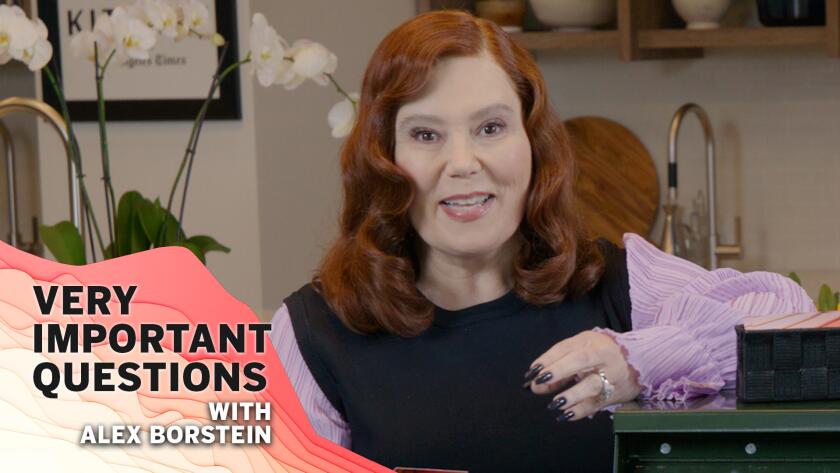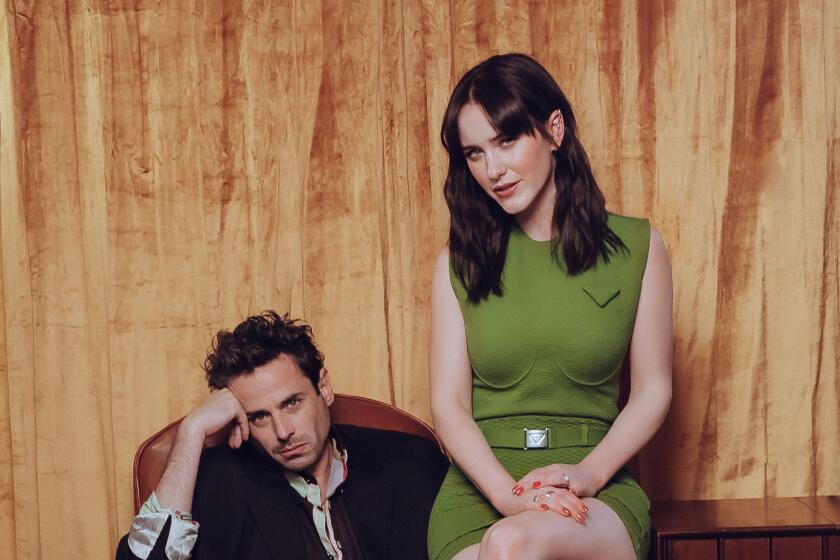Alex Borstein on the ‘Marvelous Mrs. Maisel’ finale and ‘commanding respect’ like Susie
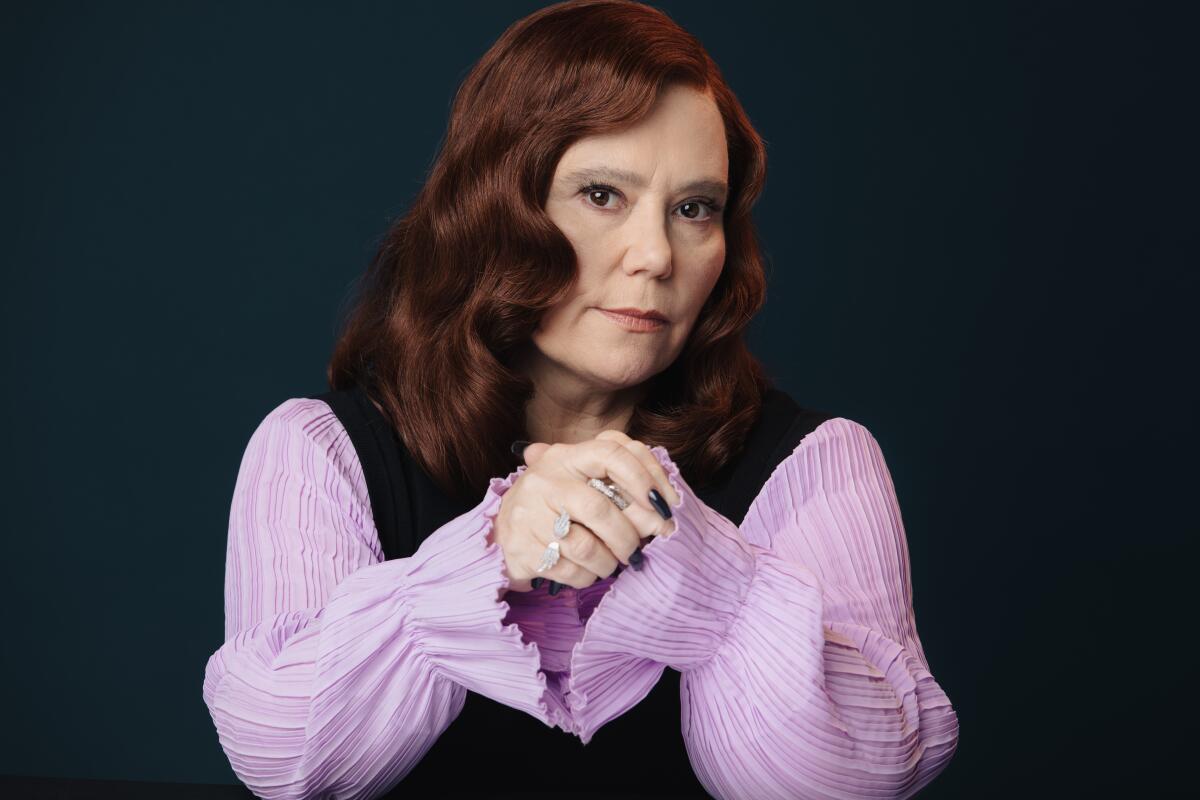
- Share via
This article contains spoilers for the series finale of “The Marvelous Mrs. Maisel.”
“The Marvelous Mrs. Maisel,” the Emmy-winning Prime Video comedy series that concluded its five-season run on Friday, is a story built to fight perception.
Miriam “Midge” Maisel, a New York City housewife played by Rachel Brosnahan, isn’t supposed to succeed as a comedian because she doesn’t look like someone who would: She’s too poised, too pretty, too educated and — when she’s hired to be the “lady writer” for a late-night host in Season 5 — too female to tell jokes for a living. That Midge got into this line of work only after her so-called perfect marriage fell apart serves to remind us that everything society tells nice young women to do is part of a greater hoax. (Oh, so you married well and had kids? Where’s the job security in that?)
The only person who always stood by Midge is Susie Myerson. Alex Borstein’s character is a dogged and (eventually) self-made talent manager who felt the fearlessness of the show’s heroine from the beginning. In the pilot, meandering on stage in a nightgown, Midge was so freshly scored that she bared almost everything — literally and figuratively — to a bunch of drunks at a Greenwich Village comedy club. Susie, who came from zero privilege and says that she wants to show the world that she’s not insignificant, saw in Midge someone who could speak for a lot of people who are easily dismissed because she walked the walk of a classy broad. So Susie bails the newly minted divorcee out of jail after she was booked for indecency.
- Share via
Like much of creator Amy Sherman-Palladino’s other works, including the short-lived but beloved “Bunheads” and the paragon of young-adult programming “Gilmore Girls,” it’s the devotion that these two women have to each other that has always driven “Maisel.” When Midge and Susie have a falling out this season, their breakup scene plays like a hostile divorce. When Midge sends Susie a message for reconciliation and Susie drops everything to go to her — Nora Ephron couldn’t have scripted it better.
“The Marvelous Mrs. Maisel” star Rachel Brosnahan, creator Amy Sherman-Palladino and other key creatives break down the series’ dazzling stand-up act.
The series finale includes an homage to the pilot, twisting the circumstances so that this time, it’s Midge bailing Susie out of the slammer and hearing about her heartbreak. And the last scene of “Maisel” jumps ahead several decades and we see the two women as seniors still gabbing, but now via phone as they are no longer living in the same city. The series closes with a cover of Elvis Costello’s “Girls Talk” by the sister pop duo Tegan and Sara (Dave Edmunds’ recording made the song famous), perhaps a wink to the audience about how Sherman-Palladino and Daniel Palladino, the co-showrunner, write characters who never shut up but also to emphasize just how borderless the relationship is.
“I think that’s one of the things that’s so beautiful about their relationship is that they’ve both been at their highest highs together and their lowest lows together,” Borstein says in a recent video conversation. “They’ve both had their hearts trampled on … these were both women that were really hurt; really betrayed by somebody before in their lives.”
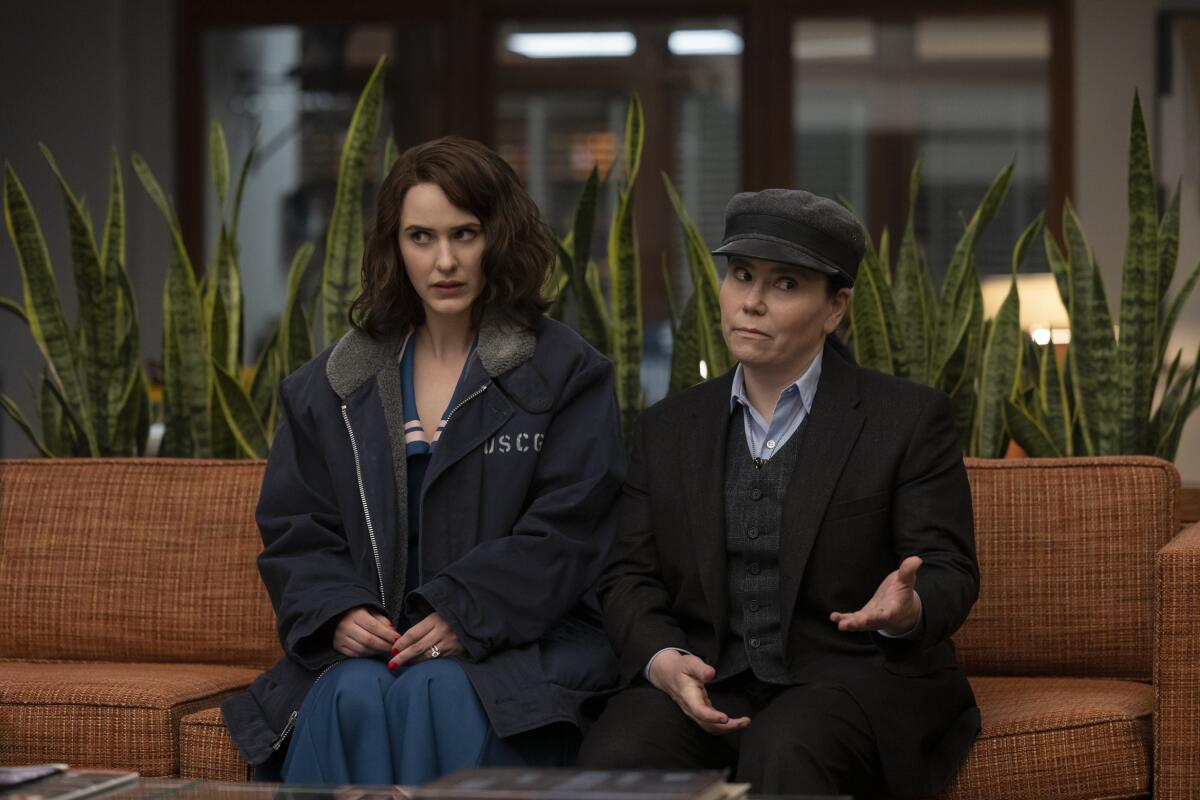
Susie’s monologue to Midge in the finale after she’s sprung from jail is one of the rare times the manager lets her guard down about her personal life and helps explain why she’s more comfortable in a life out of the limelight. Preferring to make sartorial choices free of girdles or contouring brushes, Susie assumed others who saw her next to her college sweetheart — the sophisticated and well-coiffed Hedy (Nina Arianda) — imagined a woman walking a dog.
Alex Borstein relishes the craft of the character actor. She doesn’t have to carry ‘Mrs. Maisel’ or even be likable.
Borstein — whose other notable work includes voicing matriarch Lois Griffin and other characters on the animated series “Family Guy” and starring in five seasons of the sketch series “Mad TV” — loves playing a part for which she was “completely comfortable in flat shoes and pants and hair back in a ponytail every day.” (In another twist, the final shots of the show have Midge in pants and Susie in a dress. It’s a blue caftan that’s inspired by one that Borstein’s mother wore in a video that appeared on the actress’ Instagram. The series costume designer, Donna Zakowska, initially thought the video was of Borstein herself.)
Borstein thinks it’s funny when she’s not recognized at red-carpet events because she looks completely different from her “Maisel” character. But she’s a woman, and one who works in Hollywood at that.
This spring, Borstein, with her friends the musicians Salvador Rey and Eric Mills, released the Prime Video special “Alex Borstein: Corsets & Clown Suits.” It starts with a cold open of Borstein in a dressing room exploring costume choices. She thinks she’s going to be forced to wear a sequined get-up with pasties. As it turns out, that’s for the burlesque performer Rosie Cheeks. Borstein, so we’re told, is expected to wear a clown suit.
“I think that most women are struggling between two or more things,” she says of the opening, which questions the notion that actresses can either be funny or pretty, but not both. ”Women want to know if they can be these two things. … Maybe it’s just being funny and a mom but also being seen as sexual. Maybe it’s being seen as a mother and also as a prominent force in the workforce.”
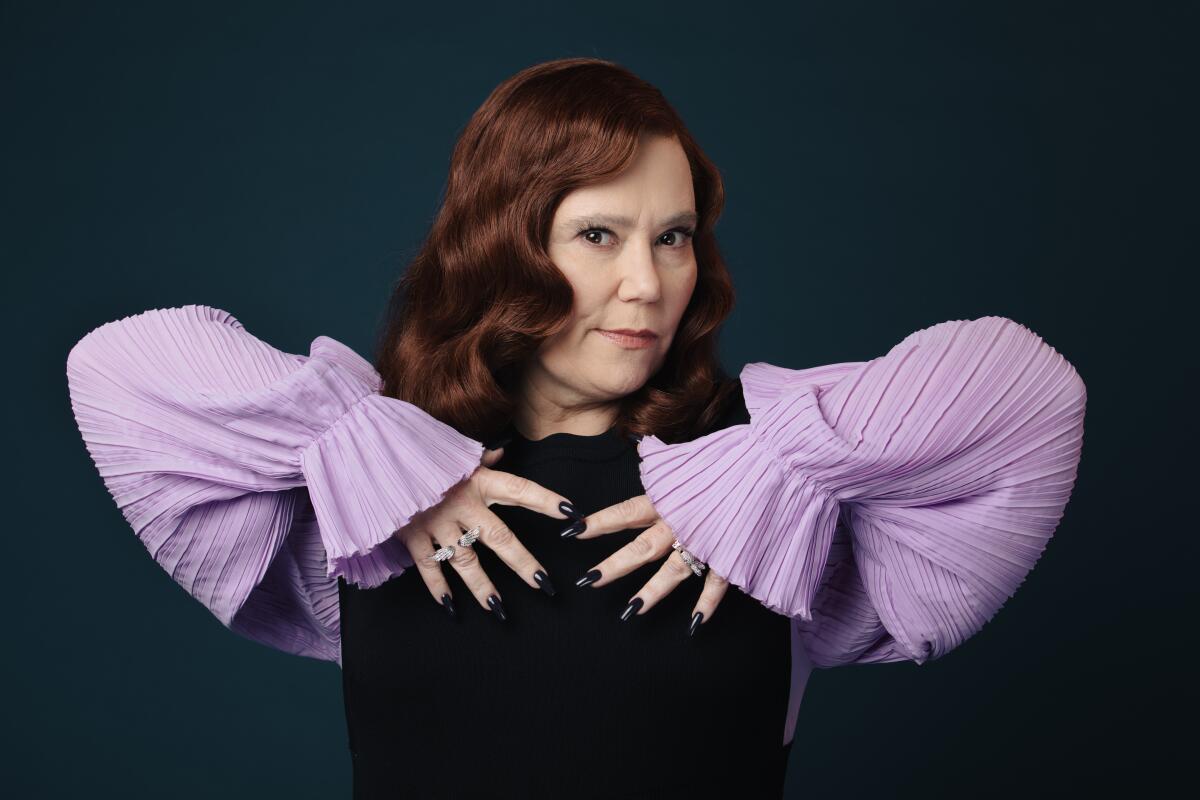
During the performance, she talks (and sometimes sings) frankly about her complicated divorce from actor Jackson Douglas, her thoughts on modern-day grooming practices, and whether she’d ever feel comfortable dating someone new. In doing this, she speaks for a lot of people who are just done with society’s expectations.
“Of course, obviously, there are certain things you want: You want to look nice, you want to go into a room and ‘slay,’ so to speak, [and] you want to command some respect,” Borstein says in the interview. “But I’ve let go of the fact of just being perceived that way. I want to actually command respect; not just be perceived as someone who should be respected. I want to be respected because I deserve it.”
This goes for both her personal and work life. She says this makes a show like “Corsets” scary because “you also want to be cast in other roles and be seen in different ways. But, in the end, it’s like … this is one side of me. And you’re either going to be interested in my talent or me or not.”
This ferocity and confidence might be ingrained in Borstein. Her mother and her grandmother survived the Holocaust. The actress spoke of the latter in 2019 when she won her second Emmy for playing Susie on “Maisel.” In her acceptance speech, she described how her grandmother avoided being shot to death simply by walking away from a crowd rounded up for slaughter. She told women to “step out of line” when they were pressed to conform.
In “Corsets,” she tells more of her family’s story. But she puts a Brooksian spin on it: At one point, she imagines herself to be the bunker employee tasked with cleaning up Adolf Hitler’s and Eva Braun’s bodies. Her parents were in the audience cheering her on.
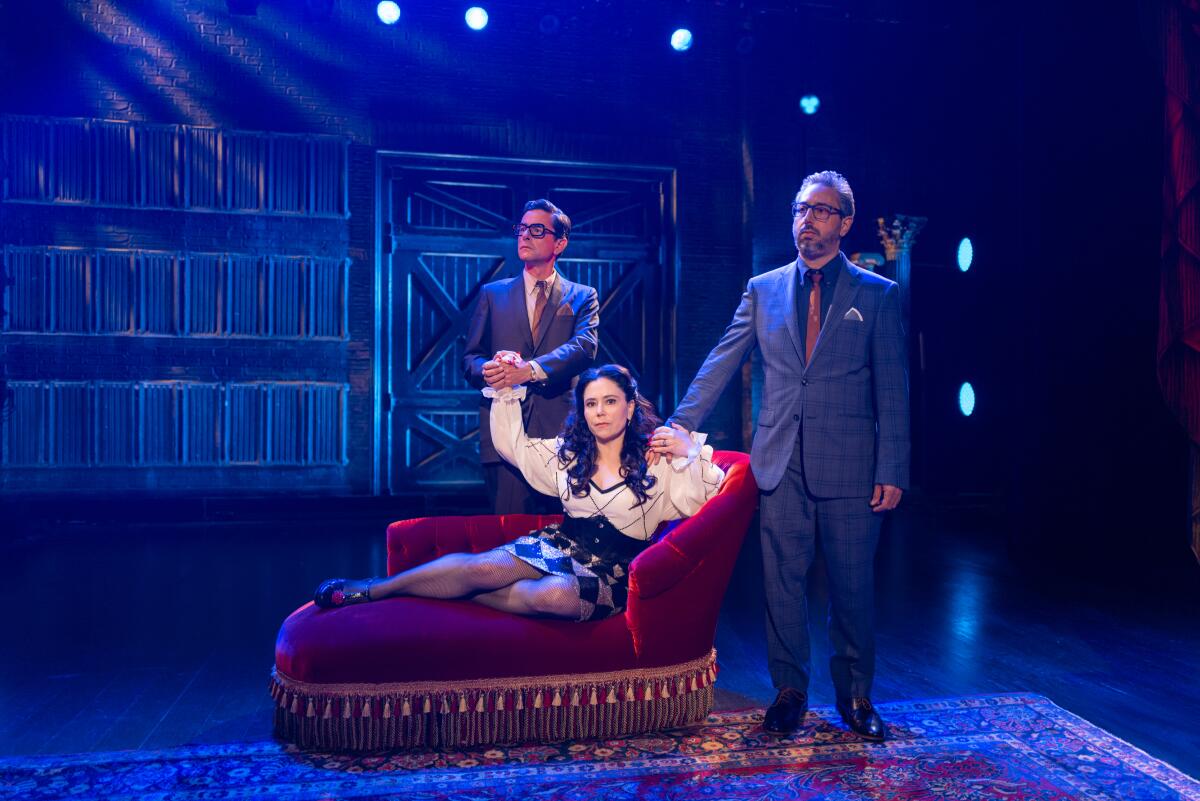
“Comedy is two things, in my book: It’s persuasion and it’s offense,” Borstein says now. “If you’re not persuading someone, you’re offending them. And if you’re not doing either of those, it’s probably not funny.”
She says she doesn’t tell stories just for salaciousness. “I talk about stories I’ve heard or stories that have happened to me that shocked me. I want to share and get past that shock myself and maybe unpack a little bit of why it is shocking.”
A need to challenge, or at least question, the status quo is something Borstein shares with Susie — a character who forced her way into a men’s bathhouse this season just to close a deal for a client (while she’s there, she also signs the cabaret singer who was performing during her impromptu pitch meeting). Susie loves making people famous even if she herself does not want any attention. There was even debate as to whether she’d show up to her own Friars Club roast.
Borstein knows it sounds like semantics, but she thinks there is a difference between Susie’s goals and those of her No. 1 client, Midge.
“I think Midge wanted fame and Susie wanted success,” she says after a quick ponder. She goes back to Susie’s line in the pilot about wanting to not be insignificant and says that success to Susie “is about commanding respect. It’s about being able to afford things in your life that you want; the nice things and not struggling and suffering.”
How did it happen? And what comes next? Stars of “The Marvelous Mrs. Maisel” reveal the magic that happens on set.
Especially because Susie never had children or was in another serious relationship after Hedy, Borstein feels that Susie could have wanted a sense of immortality and “to have something she leaves behind.”
Whereas, she says she believes “Midge wanted fame; Midge wanted other people’s approval, and the laughter and the applause.”
Borstein thinks about this in comparison to her own career. As a public figure, she’s encouraged to have a social media presence because it helps her get jobs. She thinks there’s “more of a blurry line between fame and success now.”
But she also has two kids and thinks “it’s super interesting that there’s pieces of me left” for them, either through stories or through tangible items. Borstein has a giant Tupperware container that’s labeled “nostalgia,” and it’s filled with things like Barbie dolls from her earlier career working in advertising (Mattel was a client) and issues of TV Guide that featured her shows.
“It’s interesting little items that in 50 years my kids might open and then sell at a secondhand store or online,” she says with a laugh.
Because the difference between junk and mementos is all about perception.
‘The Marvelous Mrs. Maisel’
Where: Prime Video
When: Any time
Rating: 16+ (may be unsuitable for children under the age of 16)
More to Read
The complete guide to home viewing
Get Screen Gab for everything about the TV shows and streaming movies everyone’s talking about.
You may occasionally receive promotional content from the Los Angeles Times.
